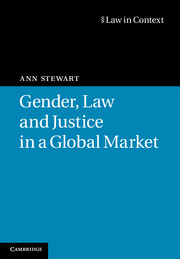Book contents
- Frontmatter
- Contents
- Figures
- Acknowledgements
- Abbreviations
- Introduction Living in a Global North consumer society
- 1 Constructing relationships in a global economy
- 2 Globalising feminist legal theory
- 3 State, market and family in a Global North consumer society
- 4 Gender justice in Africa
- 5 From anonymity to attribution
- 6 Constructing body work
- 7 Global body work markets
- 8 Constructing South Asian womanhood through law
- 9 Trading and contesting belonging in multicultural Britain
- Conclusion
- References
- Index
3 - State, market and family in a Global North consumer society
Published online by Cambridge University Press: 05 June 2012
- Frontmatter
- Contents
- Figures
- Acknowledgements
- Abbreviations
- Introduction Living in a Global North consumer society
- 1 Constructing relationships in a global economy
- 2 Globalising feminist legal theory
- 3 State, market and family in a Global North consumer society
- 4 Gender justice in Africa
- 5 From anonymity to attribution
- 6 Constructing body work
- 7 Global body work markets
- 8 Constructing South Asian womanhood through law
- 9 Trading and contesting belonging in multicultural Britain
- Conclusion
- References
- Index
Summary
Introduction
Globalisation is affecting gender relations in complex ways. This book explores the connections created between a Global North multicultural consumer society and a range of Global South jurisdictions when needs that are associated with social reproduction are, to differing degrees, reconstructed through global market processes as desirable goods and services. These processes create gender-based inequalities within and across societies. Within the overall framework of this book set out in Figure 1 in the Introduction, this chapter is represented by the Global North pyramid. It is concerned with socio-economic and regulatory contexts (the vertical relationships between market, state and family/households).
The UK occupies a particular place within the global market as the producer of desires and demands. It has a strong national economy and a relatively powerful position within a dominant regional trading body, the EU. Most of its citizens have access to formal paid employment and enjoy relatively affluent lifestyles based upon the consumption of a wide range of goods and services. The state is also able to provide a reasonable social safety net to most of its citizens. Britain’s colonial history has structured its economic and social history and this legacy continues to play a significant role in the organisation of society although the realignment of interests within the European regional trading bloc has had an increasingly important impact on social and economic relations. Thus Britain is a prosperous, multicultural, consumer-based society, which nevertheless is built on major social and economic inequalities. In 2008–2009 there were 2.8 million children (proportionately more than most rich countries), 5.8 million working-age adults and 2.3 million pensioners living in relative poverty (proportion living in households with below 60 per cent of contemporary median net disposable household income) (Department for Work and Pensions 2010).
- Type
- Chapter
- Information
- Gender, Law and Justice in a Global Market , pp. 66 - 99Publisher: Cambridge University PressPrint publication year: 2011



